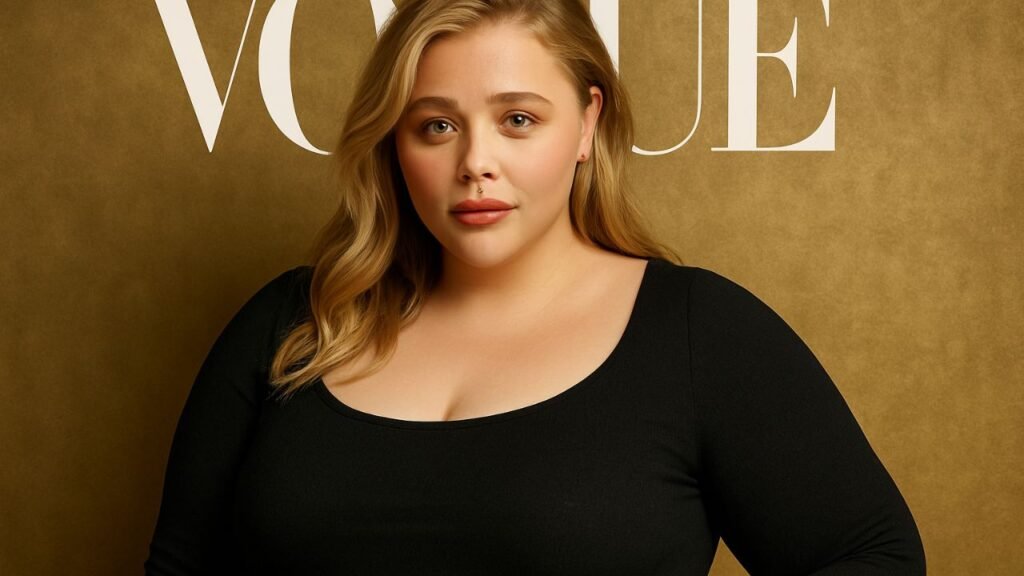Chloe Grace Moretz – Chloe Grace Moretz’s latest appearance on the cover of Vogue has ignited a powerful conversation around body positivity and self-acceptance across South Africa. As a globally recognized actress, Moretz’s decision to embrace her natural form on such a prestigious platform sends a strong message to young South Africans struggling with societal beauty standards. This cover story not only celebrates diversity in body shapes and sizes but also encourages women and men alike to embrace their authentic selves without succumbing to the pressures of unrealistic ideals. Schools and colleges, including institutions like Marian Institute, are noticing the impact of such campaigns on students’ self-esteem, with educators reporting increased interest in wellness programs and self-care initiatives. Moreover, South African media has widely discussed the cover, emphasizing the importance of mental health and the positive psychological effects of body-positive messaging. This trend aligns with global movements led by celebrities advocating for self-love, which can influence local communities to create inclusive and supportive environments. By highlighting Moretz’s role, we can understand how international media can directly influence societal perceptions and inspire change.

The Cultural Significance of Moretz’s Vogue Cover in South Africa
Chloe Grace Moretz’s Vogue cover is culturally significant because it challenges the stereotypical portrayal of beauty often perpetuated in South African media. Historically, fashion and entertainment industries have emphasized narrow body types, often sidelining the diversity inherent in South Africa’s population. By featuring a young actress who openly embraces her individuality, Vogue sets a precedent that encourages local publications to follow suit. Educational institutions such as Marian Institute have started integrating discussions about body image and self-confidence into their student counseling sessions, acknowledging the influence of media on youth. The cover serves as a catalyst for broader discussions about self-acceptance, diversity, and mental health, allowing communities to critically assess the standards they uphold. Local fashion campaigns have also taken notice, with several initiatives promoting inclusive sizing and celebrating a wide range of body types, thereby reinforcing the idea that beauty is multifaceted and should not be confined to rigid norms.
Impact on Youth and Student Communities
The reaction to Moretz’s Vogue cover among young South Africans has been profound, especially within university and high school environments. Students at institutions like Marian Institute have reported feeling empowered by seeing public figures embrace their authentic selves. Workshops and seminars on body positivity have been organized, fostering a supportive atmosphere where students can discuss insecurities and self-image without fear of judgment. This movement also intersects with digital platforms, as social media campaigns amplify the message of self-love, creating a community where young people can share experiences and support each other. Research indicates that exposure to body-positive content can significantly reduce anxiety and depression related to appearance, making these campaigns vital for adolescent mental health. By celebrating the achievements and confidence of international figures like Moretz, South African youth are motivated to pursue personal development, self-care, and healthy lifestyle choices while rejecting unrealistic societal pressures.
Role of Media in Promoting Body Positivity
Media plays an essential role in shaping perceptions about body image, and Chloe Grace Moretz’s Vogue cover exemplifies this influence. Coverage in major outlets, both globally and within South Africa, has sparked discussions around inclusivity and representation in the fashion industry. Students and young adults consume media regularly, and positive portrayals of diverse body types can challenge harmful stereotypes and promote acceptance. Institutions such as Marian Institute leverage media examples like Moretz’s cover in classroom discussions and wellness programs, encouraging students to critically analyze the messages they receive. Furthermore, local media has begun collaborating with mental health organizations to reinforce the importance of self-esteem and resilience, using high-profile campaigns as a bridge to foster broader societal change. The visibility of such role models ensures that body positivity is not just a trend but a sustainable movement with tangible impacts on daily life.
Long-Term Implications for South African Society
The long-term implications of Moretz’s Vogue cover for South African society are far-reaching, particularly in terms of mental health, education, and media representation. By normalizing diverse body types, public figures can inspire systemic change, encouraging educational institutions to prioritize student wellness and inclusivity. Programs at Marian Institute and other colleges have begun integrating body positivity into life skills courses, reflecting a broader societal acknowledgment of its importance. Additionally, the fashion and entertainment industries are increasingly held accountable for promoting unrealistic standards, leading to more ethical representation in media campaigns. Over time, these shifts can foster a generation that values authenticity, self-respect, and mutual support. Chloe Grace Moretz’s cover may seem like a single moment in pop culture, but its ripple effects are contributing to a body-positive movement that challenges entrenched biases, uplifts communities, and encourages South Africans to celebrate their unique identities and embrace diversity in all its forms.





